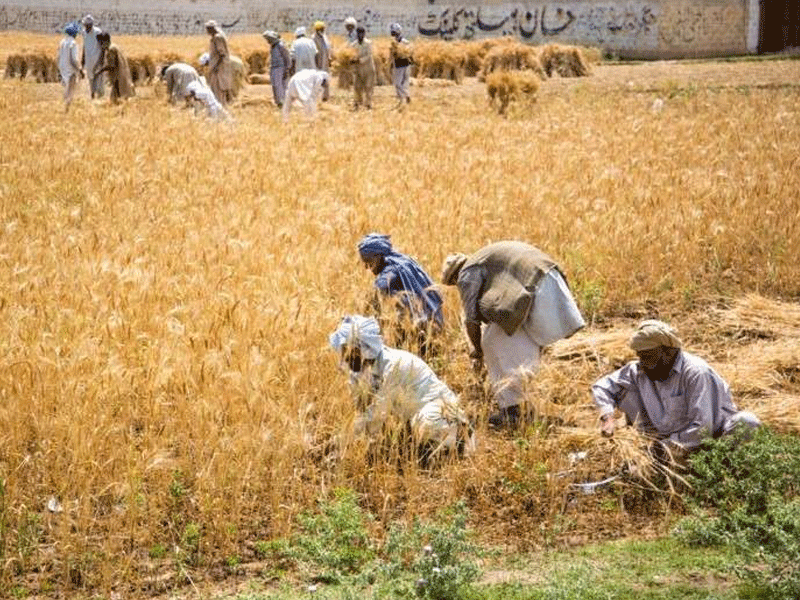Challenges facing Pakistani farmers

- 136
- 0
Agriculture is the backbone of Pakistan's economy, contributing significantly to its GDP and providing livelihoods to a vast majority of its population. Despite its importance, Pakistani farmers face a myriad of challenges that hinder their productivity, profitability, and overall well-being. From structural issues to environmental concerns, the agricultural sector grapples with numerous obstacles that require attention and strategic solutions.
- Water Scarcity and Irrigation Problems: Water scarcity is one of the most pressing challenges facing Pakistani farmers. The country heavily relies on irrigation for agriculture, with the majority of its arable land dependent on water from the Indus River system. However, inefficient water management, outdated irrigation infrastructure, and depletion of groundwater resources exacerbate the problem. Farmers often face irregular water supplies, leading to decreased crop yields and increased production costs.
- Land Degradation and Soil Erosion: Land degradation and soil erosion pose significant threats to agricultural productivity in Pakistan. Unsustainable land use practices, such as overgrazing, deforestation, and improper soil management, contribute to soil erosion and fertility loss. As a result, farmers struggle to maintain soil health, leading to decreased crop yields and increased vulnerability to climate-related risks.
- Climate Change Impacts: Pakistan is highly vulnerable to the impacts of climate change, including extreme weather events such as floods, droughts, and heatwaves. These events disrupt agricultural activities, destroy crops, and damage infrastructure, leading to significant economic losses for farmers. Additionally, shifting weather patterns and unpredictable rainfall make it challenging for farmers to plan and manage their crops effectively.
- Limited Access to Credit and Agricultural Inputs: Many small-scale farmers in Pakistan face barriers in accessing credit, which limits their ability to invest in modern farming technologies, high-quality seeds, fertilizers, and pesticides. Moreover, the high cost of agricultural inputs further exacerbates the financial burden on farmers, particularly those with limited resources. Without access to affordable credit and inputs, farmers struggle to adopt modern farming practices and improve their productivity.
- Market Constraints and Price Volatility: The agricultural sector in Pakistan is characterized by market constraints and price volatility, which often result in low profitability for farmers. Fluctuating prices of agricultural commodities, coupled with inadequate market infrastructure and middlemen dominance, undermine farmers' bargaining power and profitability. As a result, many farmers face challenges in accessing lucrative markets and receiving fair prices for their produce.
- Lack of Technological Adoption and Extension Services: Limited adoption of modern agricultural technologies and inadequate extension services further impede the productivity and competitiveness of Pakistani farmers. While technological innovations such as precision agriculture, drip irrigation, and mechanization have the potential to enhance efficiency and productivity, their adoption remains low due to various barriers, including lack of awareness, technical know-how, and financial resources.
- Policy and Governance Issues: Inconsistent policies, inadequate governance, and bureaucratic hurdles also contribute to the challenges faced by farmers in Pakistan. Policy inconsistencies, lack of coordination among government agencies, and ineffective implementation mechanisms hinder the development of the agricultural sector and exacerbate existing challenges. Moreover, the absence of comprehensive land reforms and ineffective land tenure systems restrict farmers' access to land and undermine their long-term security.
Addressing the Challenges: Addressing the challenges faced by farmers in Pakistan requires a multi-faceted approach that addresses structural issues, improves water management practices, enhances climate resilience, promotes sustainable land management, and strengthens market linkages. Investments in irrigation infrastructure, promotion of water-efficient technologies, implementation of climate-smart agriculture practices, and expansion of rural credit facilities can help improve the resilience and livelihoods of farmers.
Furthermore, reforms in agricultural policies, better governance mechanisms, and investments in agricultural research and extension services are essential to create an enabling environment for sustainable agricultural development. Collaboration among government agencies, private sector stakeholders, civil society organizations, and international partners is crucial to address the complex challenges facing Pakistani farmers and transform the agricultural sector into a vibrant and resilient engine of economic growth and development.
Published in The Daily National Courier, March, 29 2024
Like Business on Facebook, follow @DailyNCourier on Twitter to stay informed and join in the conversation.

















































